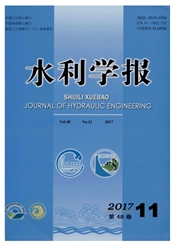

 中文摘要:
中文摘要:
在水电站梯级建设条件下,上游电站控制洪水下泄流量可减少下游施工导流风险、降低工程投资,但同时增加了上游电站的防洪风险和控泄成本。为有效地均衡上下游风险,合理分配二者利益,本文从梯级系统总体角度出发,通过对控泄参与双方控泄成本和效益的货币化,分析风险承担方和收益方在达成风险补偿共识过程中的博弈行为,建立基于激励与参与约束下的风险补偿模型,选择最优控泄流量并预计该流量下的补偿结果,实现上游控泄条件下施工导流风险补偿决策的优化。最后通过算例分析,验证该风险补偿模型是可行的、有效的。
 英文摘要:
英文摘要:
Under the condition of cascade hydropower stations development, upstream flow control can re- duce the downstream diversion risk and investment in project, but meanwhile increase flood risk and flow control cost of the upstream power station. In order to effectively balance the risk and properly distribute the interest between upper and downstream, upstream flow control cost and benefit of participants were mon- etized from the perspective of the whole cascade system, the behaviors of risk undertaker and beneficiary were analyzed in the process of reaching a consensus, which helps to build a risk compensation model based on incentive and restraint, choose optimal releasing discharge and estimate corresponding compensa- tion result. This model call realize the diversion risk compensation decision optimization on condition of up- stream flow control. Finally, a numerical example shows that the risk compensation method is feasible and effective.
 同期刊论文项目
同期刊论文项目
 同项目期刊论文
同项目期刊论文
 The scheme optimization study on construction diversion with flow control feature of upstream operat
The scheme optimization study on construction diversion with flow control feature of upstream operat 期刊信息
期刊信息
